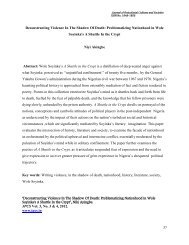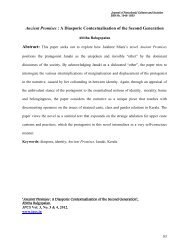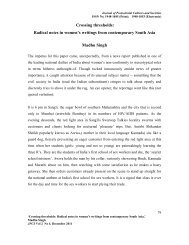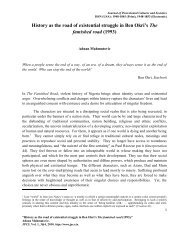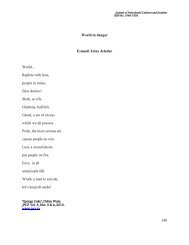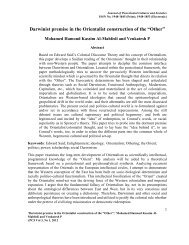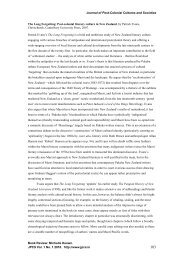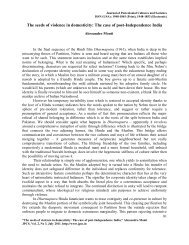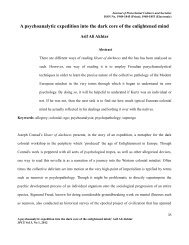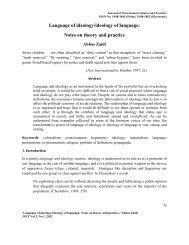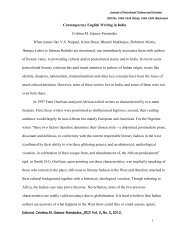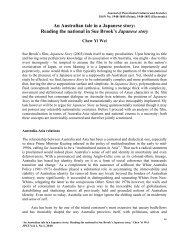Postcolonial literature in Africa: When Africans began to tell ... - JPCS
Postcolonial literature in Africa: When Africans began to tell ... - JPCS
Postcolonial literature in Africa: When Africans began to tell ... - JPCS
You also want an ePaper? Increase the reach of your titles
YUMPU automatically turns print PDFs into web optimized ePapers that Google loves.
Journal of <strong>Postcolonial</strong> Cultures and SocietiesISSN (USA): 1948-1845 (Pr<strong>in</strong>t), 1948-1853 (Electronic)Ngugi wa Thiongo’s novel A Gra<strong>in</strong> of Wheat also sheds more light on the character of<strong>Africa</strong>ns, <strong>to</strong>uch<strong>in</strong>g some areas that are essential for the cont<strong>in</strong>uation of <strong>Africa</strong>n identity. Hewrites:God helps those who help themselves, it is said, with f<strong>in</strong>gerspo<strong>in</strong>t<strong>in</strong>g at self-made man who has atta<strong>in</strong>ed wealth and position,forgett<strong>in</strong>g that thousands of others labour and starve, day <strong>in</strong>, day out,without ever improv<strong>in</strong>g their lot. This moral so readily adm<strong>in</strong>istered,seemed true for Gikonyo. People <strong>in</strong> Thabai said: Detention camps havetaught him <strong>to</strong> rule himself (Ngugi wa Thiongo 57).The quotation above describes a scenario where an <strong>Africa</strong>n has amassed stupendouswealth while others wallowed <strong>in</strong> abject poverty daily <strong>to</strong> f<strong>in</strong>d sustenance for themselves and theirfamilies. Here, we see the picture of unequal wealth distribution as prevalent <strong>in</strong> othercommunities of the world. Gikonyo, a man who had seen many <strong>in</strong>carcerations, is said <strong>to</strong> haveatta<strong>in</strong>ed a certa<strong>in</strong> level of self-determ<strong>in</strong>ation ow<strong>in</strong>g <strong>to</strong> his many trials and tribulations. But<strong>in</strong>stead of be<strong>in</strong>g disconcerted by his sad experiences, Gikonyo utilized the unique opportunity <strong>to</strong>transform himself. All the descriptions given <strong>in</strong> the forego<strong>in</strong>g confirm that <strong>Africa</strong>ns are a bunchof creative, humanistic and realistic people—they go through the ups and downs that mostpeople <strong>in</strong> other cultures go through. They work hard <strong>to</strong> motivate their people <strong>to</strong> act withimpunity and contribute their best <strong>in</strong> develop<strong>in</strong>g their ever-expand<strong>in</strong>g societies.Both Arrow of God and A Gra<strong>in</strong> of Wheat were selected as texts for this paper simplybecause they represented the feel<strong>in</strong>gs, activities, and behaviors of people who had lived dur<strong>in</strong>gthe colonial era. They show the sides of <strong>Africa</strong>ns that were neglected or subverted by plethora ofnon-<strong>Africa</strong>n <strong>literature</strong>. They revealed the real <strong>Africa</strong>ns the way they were <strong>in</strong> those days withoutany embellishments or subtraction.It must be stated that modern-day readers of these two novels may feel the need <strong>to</strong> justifythe observations that <strong>Africa</strong>ns dur<strong>in</strong>g the colonial era were simple, non-technologicallydeveloped and depend ma<strong>in</strong>ly on community unity <strong>to</strong> keep go<strong>in</strong>g. This is true <strong>to</strong> some extent;however, this paper only attempts <strong>to</strong> show that simple <strong>Africa</strong>n conclaves have strong communitysense that produces the much-required unity. <strong>Africa</strong>ns pay serious attention <strong>to</strong> leadership asshown <strong>in</strong> the quoted passages above, and they designed their own modalities for handl<strong>in</strong>gdomestic and <strong>in</strong>ter-tribal problems. This observation <strong>in</strong> itself supports the fact that <strong>Africa</strong>ncommunities are complex, not simple; and they are <strong>in</strong>tricately designed that every member of acommunity understand his or her responsibility <strong>in</strong> mak<strong>in</strong>g the entire <strong>in</strong>habitants of thatcommunities <strong>to</strong> live <strong>in</strong> peace <strong>to</strong>gether.As a matter of fact, this paper attempts <strong>to</strong> <strong>in</strong>vite readers <strong>to</strong> see <strong>Africa</strong>ns that were notproperly represented <strong>in</strong> non-<strong>Africa</strong>n <strong>literature</strong> then. It serves <strong>to</strong> create awareness that <strong>Africa</strong>, likeevery other cont<strong>in</strong>ent, passes through phases of civilizations and developments. The modern-day<strong>Africa</strong>ns may have adopted new and various different lifestyles unlike their forebears, but itstands <strong>to</strong> prove that <strong>Africa</strong>ns are a people with rich his<strong>to</strong>ry, culture and language. <strong>Africa</strong>ns arenot savages or dullards, but possess human souls that are capable of self-regeneration through theapplication of the appropriate knowledge, <strong>in</strong>formation and education. To see a group the waythey are should be regarded as the beauty of <strong>literature</strong>.“<strong>Postcolonial</strong> <strong>literature</strong> <strong>in</strong> <strong>Africa</strong>: <strong>When</strong> <strong>Africa</strong>ns <strong>began</strong> <strong>to</strong> <strong>tell</strong> their own s<strong>to</strong>ries,” Jerry Tunde Olasak<strong>in</strong>ju<strong>JPCS</strong>, Vol. 2, No 3, July 2011. http://www.jpcs.<strong>in</strong>16



